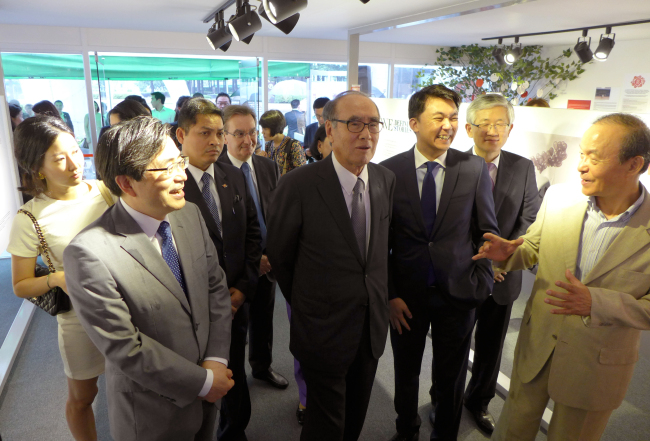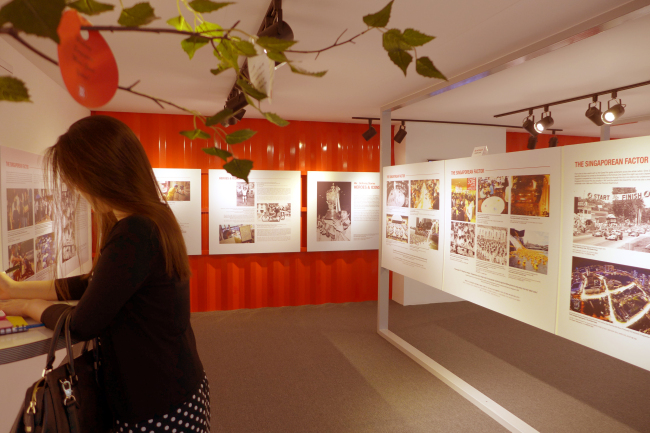Singapore, Korea commemorate golden jubilee with photo exhibition
By Korea HeraldPublished : July 26, 2015 - 18:42
The small Southeast Asian city-state of Singapore has good reason to celebrate five decades of progress this year.
After gaining independence from Malaysia in 1965, “Singapura,” meaning the Lion City, has charted a course described as “exceptional” even by the highest global standards.
The city of 5 million residents is a global hub of finance, commerce, shipping and tourism, and tops international rankings in living standard, education, health care and economic competitiveness.
The golden jubilee year saw the passing of Singapore’s founder, former Prime Minister Lee Kuan Yew, whose funeral in March was attended by throngs of people from all corners of the globe.
After gaining independence from Malaysia in 1965, “Singapura,” meaning the Lion City, has charted a course described as “exceptional” even by the highest global standards.
The city of 5 million residents is a global hub of finance, commerce, shipping and tourism, and tops international rankings in living standard, education, health care and economic competitiveness.
The golden jubilee year saw the passing of Singapore’s founder, former Prime Minister Lee Kuan Yew, whose funeral in March was attended by throngs of people from all corners of the globe.

This year also marks the 40th anniversary of the establishment of diplomatic ties between Singapore and Korea.
“From poor, fledgling nations to global economic powerhouses, we have come a long way in the last five decades to become ‘Asian Tigers,’ collaborating and learning from each other,” Singapore Ambassador Yip Wei Kiat told The Korea Herald in an interview.
“Singapore’s transformations are testament to our commitment to meritocracy, multiculturalism and social harmony that have inspired a spirit of self-reliance and excellence.”
Major milestones in the two countries’ intertwined histories are displayed at a photo exhibition titled “We: Defining Stories” at the Seoul Finance Center from July 23-Aug. 2, organized by the Singapore Embassy.
The exhibited photographs, stamp collections and movie clips were catalogued by the National Archives of Singapore and Korea, Singapore Press Holdings, National Museum of Singapore, Singapore Philatelic Museum and the Singapore National Heritage Board.
The Korea Herald spoke with the newly appointed envoy on the country’s vision forward, significance of bilateral ties, the government’s future challenges and secret behind the success of the Singaporean civil and Foreign Service.
“From poor, fledgling nations to global economic powerhouses, we have come a long way in the last five decades to become ‘Asian Tigers,’ collaborating and learning from each other,” Singapore Ambassador Yip Wei Kiat told The Korea Herald in an interview.
“Singapore’s transformations are testament to our commitment to meritocracy, multiculturalism and social harmony that have inspired a spirit of self-reliance and excellence.”
Major milestones in the two countries’ intertwined histories are displayed at a photo exhibition titled “We: Defining Stories” at the Seoul Finance Center from July 23-Aug. 2, organized by the Singapore Embassy.
The exhibited photographs, stamp collections and movie clips were catalogued by the National Archives of Singapore and Korea, Singapore Press Holdings, National Museum of Singapore, Singapore Philatelic Museum and the Singapore National Heritage Board.
The Korea Herald spoke with the newly appointed envoy on the country’s vision forward, significance of bilateral ties, the government’s future challenges and secret behind the success of the Singaporean civil and Foreign Service.

The Korea Herald: As this year marks Singapore’s 50th independence anniversary, what is the country’s vision moving forward out of the Lee Kuan Yew era?
Yip Wei Kiat: In a recent speech, Prime Minister Lee Hsien Loong outlined concurrent national priorities for the next 10, 25 and 50 years.
In the next 10 years, we want to continue to raise our GDP per capita ― currently $56,000. To do so, Singapore needs to tap our society’s productive forces and people’s creative desires. We need higher wages, lower unemployment and better life opportunities. However, as there is no development model for us to benchmark, we must shape our own future.
Our government’s focus has always been growing the nation’s economic pie. Since the 1970s, our government nurtured labor-intensive industries by inviting foreign manufacturing investments that provided jobs for the locals.
Throughout the 1970s to early 1980s, our economic focus shifted from labor-intensive to capital-intensive sectors based on advanced technology and management.
Knowing that an unregulated market can lead to economically and socially undesirable results, the Singaporean bureaucracy has intervened to push our economy to higher planes ― technology-driven and knowledge-based economy.
Over the next 25 years, it is vital to raise the current total fertility rate of 1.2 children per family, one of the lowest in the world. An aging and shrinking population will have severe implications on our economy and society.
To combat the demographic decline, our government provides grants, tax incentives, education subsidies, housing benefits, child care services, and maternity and paternity leaves to families. We also promote a healthy work-life balance.
Immigration may soften the impact, but given Singapore’s small size, it is not a panacea. We want to manage the pace and composition of immigration, as well as social integration. We cannot afford to open the floodgate of immigration to a level that would alter our hard-earned identity. In keeping with this approach, Singapore’s ethnic balance ― Chinese majority (74 percent) and Malay (13) and Indian (9) minorities ― has remained much the same since the country’s founding.
Forging a strong sense of national identity and belonging will be paramount over the next 50 years.
Singapore started as a multiethnic, multicultural and multi-religious society since the beginning. Constructing a sense of national identity, where everyone feels part of a community, was essential. It was nationhood ― a sense of belonging ― rather than nationalism ― an ideological vehicle for achieving objectives ― that kept the country together.
That is why an ethnic Chinese in Singapore would identify himself or herself as “Singaporean Chinese” as opposed to “Chinese Singaporean.” This illustrates the predominance of national identity over cultural background.
At the same time, Singapore is open to individuals that can fit into the core of our society. The challenge is to maintain our identity in an era of demographic sea changes, much like trying to keep the same flavor and consistency of a cup of tea with a tea bag, while continually pouring water in.

KH: What is the significance of Singapore-Korea relations in terms of diplomacy and commerce?
Yip: Singapore and Korea have built strong bonds of friendship and cooperation over the last four decades, since former Prime Minister Lee Kuan Yew and former President Park Chung-hee established diplomatic ties in 1975. The goodwill between our leaders remains strong, as demonstrated by President Park Geun-hye’s attendance at late Lee Kuan Yew’s state funeral in March this year.
On the international stage, we share similar views and positions on a wide range of issues. We strive for an open and inclusive regional architecture for peace, security and cooperation, and consult closely to strengthen multilateral frameworks, such as the ASEAN-plus processes, East Asia Summit and APEC. We also collaborate to provide safe navigation in the Straits of Malacca and South China Sea through maritime communication lanes.
Trade and investment are the backbone of our cooperation. As major trading nations, Singapore and Korea signed a bilateral free trade agreement in 2005 that came into effect the following year. Since then, bilateral commerce has grown steadily, with the trade volume reaching $35 billion last year ― the largest among ASEAN members.
We are today one of each other’s top 10 trading partners. Singapore ranks in the top list of foreign investors in Korea, and there are more than 1,000 Korean businesses in Singapore in trading, shipping, logistics, construction and finance.
The Singapore economy is presently undergoing a transition to raise productivity to compensate for labor shortage. Likewise, Korea is also looking for new growth engines to navigate an uncertain global economic environment. Both countries can cooperate in the innovative sectors of biomedicine, education, information communication technology and meetings, incentives, conferencing and exhibition.
Singapore has embarked on a “Smart Nation Program” to increase mobile connectivity by embedding ICT in our infrastructures, companies and homes. Korea, with its world-leading ICT expertise, can help Singapore.
The two countries can cooperate more in third markets, such as the Association of Southeast Asian Nations bloc with 600 million people. Korean companies do not yet have as strong a footprint there as other foreign competitors, and as a regional hub, Singapore can be a home base for Korea making inroads into the region.
KH: The late LKY famously advocated that Asian societies were better governed by an authoritative leadership based on Confucian values. In a new global environment, will the Singaporean government adopt a more liberal form of governance?
Yip: Lee Kuan Yew’s leadership was always grounded in pragmatism (rather) than ideology. He formulated policies based on the best available information, and when things did not work, switched to alternatives.
In the early days, Lee famously said, “Poetry is a luxury we cannot afford.” Much like Korea, he encouraged the “hard skills” of labor, technology, commerce and education over the “soft skills” of literature, arts and philosophy.
But our leaders know that many of the solutions we used 50 years ago do not work today. In a recent media interview, Prime Minister Lee noted that our society has become more pluralistic and younger people have different passions.
Our biggest challenge is to maintain “unity in diversity.” Our government tries to keep a balance between the freedom of speech and the rule of law, by allowing more freedom of expression without letting things slide into chaos.
In a small country where various ethnic, religious and class groups coexist, individual aspirations must be balanced with the society’s interest. As we have seen in some countries, diversity without cohesion can unravel the social fabric very quickly and easily.
KH: What is the secret behind the success of the Singaporean bureaucracy and Foreign Service, known to be efficient, effective and incorruptible?
Yip: The Singapore Civil Service reflects what Singapore is all about in many ways. Constrained by limited resources, we have had to excel in everything to survive. As our people are our country’s only resources, Singapore has developed a lean and efficient bureaucracy and Foreign Service with competent diplomats. Today we have only 49 embassies, consulates-general and consulates around the world, which constantly prioritize our objectives for optimal outcomes.
I joined the Foreign Service more than 20 years ago after graduating from the university. It has been an exciting journey ever since. Working in the Foreign Service is not simply a job or career, but a lifestyle. It can be highly fulfilling in terms of professional and personal development, but at the same time, requires much personal and family sacrifice.
I have had the privilege of serving all three Singaporean leaders ― Prime Minister Lee Hsien Loong and former prime ministers Goh Chok Tong and Lee Kuan Yew. Singaporean officials have always been pragmatic rather than ideological, ready to change minds facing new circumstances. We have always believed “what matters is what works.”
Singapore will continue to choose what brings bread to our tables regardless of ideology. As the global environment around our nation evolves, our leadership will have to adapt. But our core objectives ― the wealth of Singapore and welfare of Singaporeans ― will not change.
By Joel Lee (joel@heraldcorp.com)
-
Articles by Korea Herald







![[KH Explains] Hyundai's full hybrid edge to pay off amid slow transition to pure EVs](http://res.heraldm.com/phpwas/restmb_idxmake.php?idx=644&simg=/content/image/2024/04/18/20240418050645_0.jpg&u=20240419100350)







![[From the Scene] Monks, Buddhists hail return of remains of Buddhas](http://res.heraldm.com/phpwas/restmb_idxmake.php?idx=652&simg=/content/image/2024/04/19/20240419050617_0.jpg&u=20240419175937)

![[KH Explains] Hyundai's full hybrid edge to pay off amid slow transition to pure EVs](http://res.heraldm.com/phpwas/restmb_idxmake.php?idx=652&simg=/content/image/2024/04/18/20240418050645_0.jpg&u=20240419100350)

![[Today’s K-pop] Illit drops debut single remix](http://res.heraldm.com/phpwas/restmb_idxmake.php?idx=642&simg=/content/image/2024/04/19/20240419050612_0.jpg&u=)